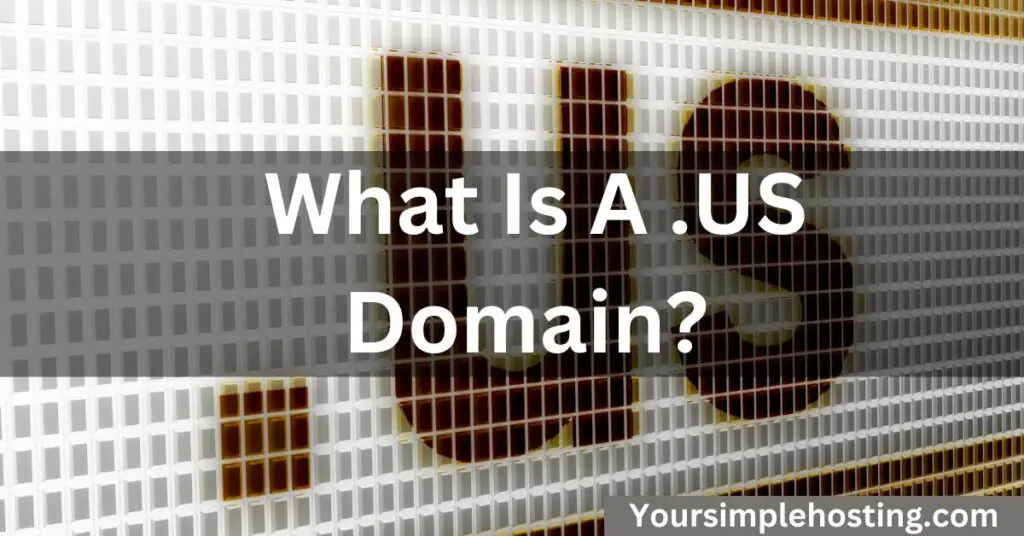When creating a website, the domain extension plays an extremely important role. Altogether, there are estimated to be around 1,500 domain extensions available, including the most famous .com, .net, .org, and .info domains.
As an avid enthusiast of the online world, I am very familiar with a number of the more commonly used domain extensions, such as those listed above. However, some are not as widely known, such as the .US domain. So, I wanted to find out more about it!
I came across the .US domain quite a while ago, but I remember being intrigued by its origins and what it was exactly. That led to the conclusion that many others out there were or are in the same boat.
So, if you’re wondering what the .US domain is, and want to find out more about this domain in general; you’re in the right place. Today, I have created this guide to what .US domains are and what they have to offer in the ever-evolving world of online presence.

Table of Contents
.US Domain Explained
Before I go into the intricacies of what a .US domain is, you’ve probably already guessed it. You see the acronym “US,” and you probably immediately associate it with the United States. Dig a little deeper, and Voilà! Yep, the .US domain is the country code for the United States.
The .US domain was first introduced back in 1985 for US websites to utilize. However, businesses need to meet a number of requirements in order to use this domain. Even if your site or business is based in the US, it may not qualify for the .US domain. We will discuss these rules and regulations for using .US the domain below.
The .US domain has been used by state and local governments for their websites since the 1980s. And there are numerous advantages to using this domain extension for websites. Some Of these are:
- Opting for .US domain names can significantly enhance your website’s chances of ranking highly amongst the competition.
- Specific domains, like .US can help businesses target their specific locality. In turn, this can increase website traffic.
- When a website targets a unique niche, user confidence can be increased. For instance, seeing a website from your own location may give you more confidence to click on it rather than a domain from another region.
- The .US domain can be considered a symbol of patriotism, attracting more visitors from those who love your country.
- The .US domain can be memorable when combined with your business name. This can help users remember your website more easily.
- Using the .US domain extension will bring a site under the US dictionary, helping promote the business.
- Such a domain can help you forge a unique business identity.
It’s all well and good knowing the pros of using a .US domain name, but if you don’t meet the required rules and regulations, you won’t be able to use one. Let’s explore these below.
.US Domain Rules And Regulations
You can only use a .US domain extension if you meet the following criteria:
- You’re a US citizen or currently reside in the country. You have to be a permanent resident of the US or any of its territories.
- You hold any business in the US, encompassing federal, local, and state government entities.
If a business or organization wants to use the .US domain, it must be located within any of the 50 states or in any territories that are organized under US law. This includes the Columbia district.
There is currently an organization known as Neustar that prevents unauthorized .US domain extension registrations. The company thoroughly checks registrants’ information to ensure they meet all the legal requirements.
If you want to use a domain extension that has been found to meet the requirements by Neustar, you may be able to, but it may take some time. Moreover, you could face certain legal consequences if you try to acquire the domain name without proper authorization.
When choosing the .US domain extension, the web hosting service needs to be chosen first. In terms of other domains, they register it with the use of proxy sites.
Nonetheless, in 2005, the National Telecommunication and Information Administration stated that those registering for a .US domain could not use proxy sites when registering any private domains.
Instead, registrants must submit contact information in full when registering for the domain. As for local registrations, the postal code of the business address is checked to ensure it is located in the locality.
.US Vs .Com SEO Rankings
According to Google, the domain extension you choose does not directly impact your SEO ranking. While .com is a popular choice due to its widespread use, other newer and less common extensions may be seen as spammy, making .com a safer option in general.
However, the .US domain holds a good status as it is exclusively used for US-based websites and is favored by government organizations, instilling trust among users.
Ultimately, content and on-page/off-page optimizations play a more significant role in SEO, but country-specific domains such as .US can be beneficial for targeting specific areas.
Therefore, it is recommended that you choose a domain extension based on your business goals, with .com suitable for a global reach and .US ideal for targeting the United States.
Some Famous Sites That Use The .US Domain
Many successful sites use the .US domain extension. Here are a few of the most famous:
Conclusion
With so many domain extensions available worldwide, it’s not always possible to guess what one means. But, when it comes to the .US domain extension, it is exactly what many people think it is – .US is the country code domain used in the United States and its territories.
Let me know if you want to make a .US domain and how you find the process of acquiring one.

Leave a Reply